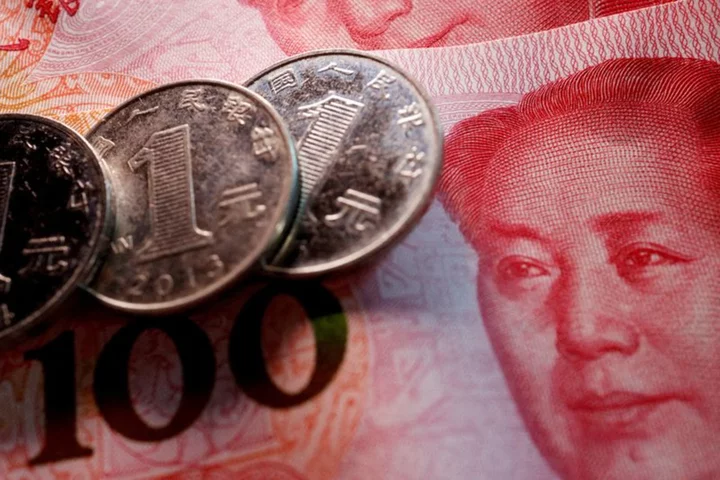By Kevin Yao and Samuel Shen
BEIJING China's promised "basket of measures" to defuse local government debt risks is likely to include special bond issuance, debt swaps, loan rollovers, and something Beijing really loathes: dipping into the central budget.
Local governments are fundamental to China's economy, with Beijing tasking provincial and city officials with meeting ambitious growth targets. But after years of over-investment in infrastructure, plummeting returns from land sales and soaring COVID costs, economists say debt-laden municipalities now represent a major risk to China's economy.
Chinese leaders last month pledged, without detailing, to help ease their debts, signalling worries over a potential chain of municipal debt defaults destabilising the financial sector.
Economists took that message as being more constructive than in April, when Communist Party leaders demanded "strict control" of local debts. The implication, they say, is that Beijing has realised it needs to urgently throw cash at the problem.
That could represent a major breakthrough in finding a way out of China's municipal debt crisis, with Beijing having for years demanded that local administrations sort themselves out.
"The local debt problem is complex so you cannot simply say you don’t want to take responsibility," said Guo Tianyong, professor at the Central University of Finance and Economics in Beijing, explaining the politburo's directions.
The extent of any central government involvement, and any conditions attached to it, are still subject to debate, two policy advisers told Reuters. Whether the package of measures will be a short-term or multi-year plan also remains unknown.
These details will be key for investors to gauge how decisive and long-lasting Beijing's solution will be.
"The size of any restructuring and the scale of the problem Beijing acknowledges is important to the success of this effort," said Logan Wright, a partner at Rhodium Group.
BEIJING'S DILEMMA
Local government debt reached 92 trillion yuan ($12.8 trillion), or 76% of economic output in 2022, up from 62.2% in 2019. Part of it is debt issued by local government finance vehicles (LGFVs), which cities use to raise money for infrastructure projects. The International Monetary Fund expects LGFV debt to reach $9 trillion this year.
The central government, which has repeatedly warned about "hidden debt risks" worries the numbers are even higher when accounting for any debt issued outside municipal balance sheets.
It is an unsustainable situation that puts Beijing in a bind: provide no help and the economic model unravels with severe consequences on growth and social stability, or step in at the risk of encouraging more reckless spending.
"A principle should be established: not all debt will be assumed by the central government," a policy adviser told Reuters on condition of anonymity.
"This could lead to moral hazard."
To avoid that risk, the adviser suggested all stakeholders bear some of the burden: financial institutions, local governments, Beijing and society at large.
OPTIONS
Most economists expect Beijing to instruct state-owned banks to keep rolling over maturing debt with longer-term loans at lower interest rates, a strategy often referred to as "extend and pretend."
The banks, however, need to be selective based on the magnitude and urgency of any refinancing task. Debt restructurings hurt their own balance sheet, hampering their ability to finance other parts of the economy.
For many local governments "to keep vital functions you need transfers from Beijing and to develop you need to issue bonds - the central leadership is aware of that," a source at a state bank told Reuters after a recent work trip to two indebted provinces.
Local governments themselves will have responsibilities, above all to come clean.
Local governments are likely to use left-over bond issuance quotas from last year to swap "hidden debt" with official bonds on their balance sheet, according to analysts, with up to 2.6 trillion yuan to be issued.
Such a move has a precedent. From 2015 to 2018, local governments issued some 12 trillion yuan of bonds to swap for off-balance sheet debt.
Beijing may also ask certain localities to sell or leverage assets to raise funds.
“Extension of local government and LGFV debt and de facto restructuring, especially with banks, will likely be encouraged, while local governments may also be pushed to sell or mortgage some assets,” said Tao Wang, chief China economist at UBS.
Then comes frugal Beijing, which has most room for manoeuvre, with a central government debt of only 21% of GDP.
Beijing issued 1 trillion yuan in special bonds in 2020 to cope with the pandemic, 1.55 trillion in 2007 to recapitalise its sovereign wealth fund and 270 billion yuan in 1998 to recapitalise the "big four" state banks.
“The central government can issue low-cost bonds to replace local debt," a second policy adviser said.
China's 10-to-30-year government bonds yield 2.7%-3.0%. Some cities and LGFVs pay 7-10% interest.
Guo, the professor, said such swaps should exceed 1 trillion yuan this year to make a difference.
More generous direct fiscal transfers for funding vital public services could also be thrown into the basket, analysts say. That path is well-trodden: the finance ministry expects a record 10 trillion yuan in such transfers this year, up 3.6% from 2022.
For the local debt problem to stop re-occuring policymakers need to implement profound changes to how the economy works.
BBVA analysts suggest diluting the growth performance criteria in evaluating local government officials.
But ultimately Beijing, and the Chinese society, may have to accept lower growth after four decades of expansion at a staggering pace.
"Whether Beijing will be able to accept a significant slowdown in local government investment, and therefore economic growth, will be one of the most important questions in any restructuring," Rhodium's Wright said.
($1 = 7.1780 Chinese yuan renminbi)
(Editing by Marius Zaharia and Lincoln Feast)









